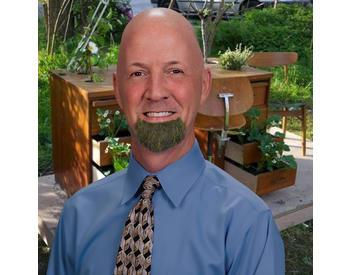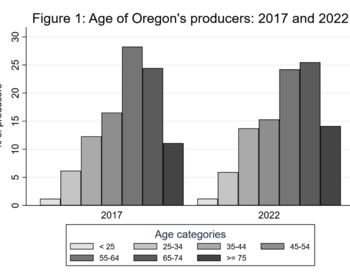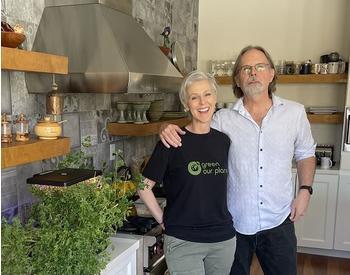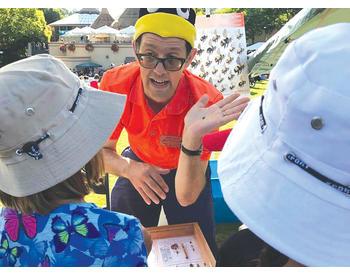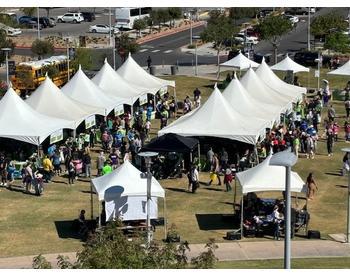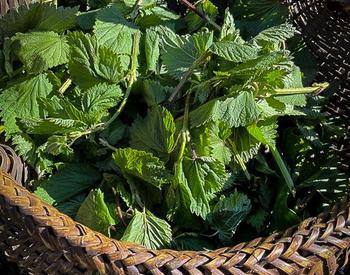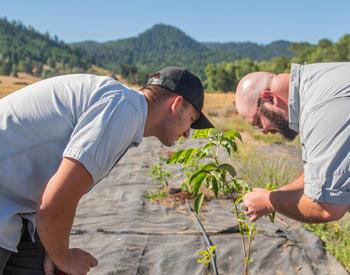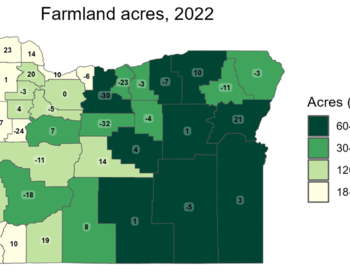Transcript
00:00:08 Rick
Welcome to the farm to school podcast where you will hear stories of how youth thrive and farmers prosper when we learn how to grow, cook and eat delicious, nutritious local foods in schools across the country and the world.
00:00:22 Michelle
Hey, we're your host, Michelle Markesteyn.
00:00:24 Rick
And I'm Rick Sherman.
00:00:25 Michelle
And today, even though we talked to folks all around the country, we are thrilled... We actually have two special guests in the studio. Hello.
00:00:34 Rick
And they are local guests! and we have Helena Kilstrom and Lindsey Flores with West Linn Wilsonville School District in West Linn, OR, and thanks for stopping by the studio locally.
00:00:49 Helena Killstrom
Yes, we're so happy to be here. Also, West Linn and Wilsonville -We're in both.
00:00:54 Rick
Did I say that?
OK. Yeah. West Linn Wilsonville. I apologize to all the Wilsonville people who felt like they were slightly so. So that's fine. So..
00:01:04 Michelle
Sounds like Whoville.
00:01:07 Rick
Lindsay and Helena, would you guys please tell what what's your roles in at the school district there? Go ahead, Helena.
00:01:16 Helena Killstrom
Yes. Hello, I'm Helena. I am the school garden coordinator for all of our primary schools in our district. So I work with all nine of our primary schools and help coordinate the programming that happens in those spaces and the support for those spaces working with all of our facilities, departments and our teachers and our parents.
00:01:40 Rick
And that what's really cool about this, listeners, that Helena's position. You work for a public school district and it's a paid full time school garden coordinator position. Is that correct?
00:01:52 Helena Killstrom
Yes, I am full time year-round, fully funded by the district. I don't have to apply for grants or anything.
00:01:55 Rick
Full time year round. That is our, I think #1 wish. You know, is for that to be replicated everywhere across the country.
00:02:08 Helena Killstrom
It's absolutely not the industry norm and it's a shame because it is very, very efficient and wonderful.
00:02:15 Rick
Now there are there are a few and it's happening more often. Usually the model I hear of is it's like a teacher gets a couple classes a day. It paid for. So like part time. Like they get to take on some things. But we're seeing more of it than we used to 15 years ago, but that's really good. So I really thank you, West Linn “Slash” Wilsonville School District for supporting that and we'll talk a little bit more about that and how it started. But Lindsey, go ahead.
00:02:48 Lindsey Flores
So I'm the nutrition services manager for the district and I facilitate the food program for all the schools and the food buying and all those partnerships and the team that gets to serve food to our kids.
00:02:59 Rick
Yeah. So we're calling this episode “cafeteria and school garden in Harmony.”
00:03:07 Michelle
Nice title I never know what we're gonna name them. Rick comes up with these titles.
00:03:07 Rick
And well, you know, I know or you do we or it just comes to us like a lightning bolt in the middle when we're talking to it. This is what we're thinking of. Hey, it might change by the end of this but but you know I've I used to be a food service director back in the day back in you know back a long time ago. But a lot of school food service programs do a farm to school program, some don't. We've talked about how there's a lot going on with regulations and it and it's farm to school might not be the number one thing for some people to get to, but it's always been a priority at West Linn-Wilsonville, as well as a few other districts locally here. And it works so well and you guys have such a good partnership. So can you guys tell us how that partnership started?
00:04:01 Helena Killstrom
So I think back to we used to have a district farm and we had a lot of extra produce at that farm. Yes, quite exciting actually. It's now becoming our most recent school that we're building a… a primary school is going right in there.
00:04:10 Rick
Used to, you're used to have a garden.
00:04:20 Helena Killstrom
There are thousands of new houses being built right on the perimeter of where the farm used to be, and we have a school going smack dab in the middle, so it was perfect.
00:04:28 Rick
So it made sense there. It was school property that nothing was going on. So why not have a farm there? But now the need is for a school. So OK.
00:04:36 Helena Killstrom
Right. Absolutely, yeah. But in my mind it was kind of like we have all this extra produce and how can we get it into some schools and I feel like in the very beginning it was cherry tomatoes that we were trying to move into lunch lines and things like that, but also where my office is located we have perennial crops like Hardy Kiwi’s and table grapes and yeah, and kids love fruit, so that has been wonderful.
00:05:04 Rick
Kiwi berries! So when was that, when that school farm started and your predecessor was Bob Carlson, right?
00:05:19 Helena Killstrom
Yeah, Bob Carlson started the farm. I want to say it was open for about 10 years or so. So that would be in about 2010. Our last season was 2018.
00:05:34 Rick
And so he retired, and then they hired you?
00:05:35 Helena Killstrom
He did. He retired and three positions came out of his position. He had been with the district for over 30 years, doing all kinds of really cool projects. And so there was this massive hole being left. And I am one of those three positions that was created.
00:05:51 Rick
What are the other two positions?
00:05:52 Helena Killstrom
We have art science instructional coordinator who's also the director of Crest and then myself and an internship coordinator.
00:06:05 Rick
Now you said “CREST.” What is that stand for?
00:06:08 Helena Killstrom
So yeah, Crest is where I work out of. It's the Center for Research and Environmental Sciences and Technologies and it's really in simple terms, it's just the Science Center for the school district working with all 16 schools.
00:06:21 Rick
I'll drop a link in our show notes. I've seen your website there. OK. And then, Lindsey, how about you? Like if you could talk about how that relationship started from foodservice with you know as well as you know from your predecessor, how did that come about?
00:06:42 Lindsey Flores
You know, I don't know that I can speak specifically to how it started. Right. I'll make something up. So when I joined one thing that kind of was already established was that, hey, we purchased grapes from this local farm or we have this connection with Crest. I don't know that I don't know the details further than that. So I don't wanna misspeak, but…
00:06:45 Rick
You can make something up.
00:07:02 Lindsey Flores
One of the things once I started is that Helena and I, with our positions, we were connecting and seeing what fits that we could purchase. What can you do in a large enough quantity from Crest or is it something that?
00:07:14 Lindsey Flores
Is just going to be utilized for tastings or in a different dynamic. So there was a season that they had a huge Kiwi Berry harvest and they had enough people to process them safely and we served them in the schools through the school line.
00:07:28 Rick
I've ate your Kiwi berries at your place. I was there years ago and had those there one and for people that don't know what Kiwi berries are.
00:07:32 Lindsey Flores
They're good, aren't they?
00:07:36 Rick
They're like the size of a really super large grape, and they're usually not fuzzy and they taste exactly like regular fuzzy Kiwi, but yeah.
00:07:48 Lindsey Flores
Ohh yeah, they're really fun. They're really fun. So I think our partnership we we're looking at what can we utilize to everything we look through the lens of exposing the children to something it may not necessarily be that huge center plate piece, but is it exposing them? Are they understanding where it's coming from? Can it hit multiple factors? And so we partnered. That triggered us to partner with another local farm that had Kiwi berries so we could give because they liked them. So then they were experiencing getting them from a couple different places. So then and we grew cherry tomatoes for a season and we did do some grapes with them. Now we aren't purchasing from Crest, we're purchasing from other local farms and we've really split to just tastings that they will gather from other places and then we are working in a different dynamic with that. But we have a lot of conversation of “How can this work together? Is our vision shifting or changing? Is what we did last year still going to work and is it still relevant?” I think that speaks to kind of how we started and then how each year has changed because I don't think that it's always a stable system. I think sometimes the concept of your relationship and what your mission is stable, but how it's executed needs room to shift and breathe. And I think that we have continued to both live that out and that I think has what has allowed it to be successful instead of saying it can only be one way.
00:09:14 Rick
I'm glad you said you were able to use the CREST items for your tastings and things like that. I have seen another model like I've told the story before about Portland public schools, when they had a kale and pear salad day and I hear that a lot from school food service directors that says Ohh our gardens don't make enough where we could feed our entire school or school district. But in that case what they did was they had a couple pieces of their kale and then like you said you supplemented your Kiwis with another farm down the street and in the case of Portland public, they got kale off the Sysco Truck or whatever, but then they still had some of their kale in there and they're able to stretch it. And the kids are still learning about what they're growing at their school garden by eating some of the stuff. So that's just another model to throw out there for you folks out there that think that you can't do it. You really can.
00:10:15 Helena Killstrom
I think it's really important to be realistic about the amount of people power that you have and what you can do.
00:10:23 Rick
How so?
00:10:26 Helena Killstrom
So when we first were working together, I was in a different position. I was the farm educator, so I had a different set of responsibilities and like it fit hand in hand that I was going to spend all morning picking tomatoes and moving them to a cafeteria as a garden coordinator, bopping around to all these different schools. I think both Lindsey and I had to think about how could we still have this wonderful connection. But know that we cannot be a production farm anymore. How can we utilize our local farmers that are already doing things so well?
00:11:02 Rick
Hmm and so how are you doing that now? What's, what's with the farm gone? How does it look right now? And what do you think in the future? How’s it going?
00:11:05 Helena Killstrom
Right. So now our produce that is used for the tastings, the small quantities and things. We have streamlined it by only doing raw products, so no one is in the back of the kitchen cutting and slicing and roasting things. It's just faster and kids are connecting to a whole product and understanding what a carrot looks like and how it interacts with it.
00:11:33 Rick
Ohh so things they can eat raw. OK, not like turnips, OK, we only give them raw. OK, got it.
00:11:35 Helena Killstrom
Yes.. No. And we're just partnering with local farmers, so I grew up with always going to farmers markets and things. I guess that's why I'm in this work now. But I have a lot of relationships with farmers and they're wonderful farmers and they do a great job and they're professionals in their field. And so we just purchased directly from them instead.
00:12:03 Rick
OK. What about the future?
00:12:08 Helena Killstrom
I'm not sure. I think it's really wonderful to think of having middle schoolers and high schoolers raising vegetables that are then served in all of the different schools, but it's really hard to run a production farm and also go to school even when we had our district.
00:12:28 Helena Killstrom
Farm, we had a farm educator and a full time farmer and a pack of students that were helping for you know, 10 weeks out of the summer, but kids are really busy and so it's hard, there's a lot of extracurriculars that students are involved in, and there's just a lot of time and effort that goes into producing food.
00:12:48 Rick
Yeah. As we're recording this, this is the middle of the hot summer. We just had a string of 100° weather it's very nice and cool 80° today, but what are you? You said you, Helena. You're a year-round instructor. And I'm sure Lindsey, you have a summer program, a Summer Food Service program going. What do you do with the garden and what do you do in the in this off season of the school as it were?
00:13:17 Helena Killstrom
So right now, Lindsey and I just finished supporting summer school that was happening for the last 3-4 weeks and so there's a kitchen open obviously for that couple kitchens actually. And then I was supporting that work as well. Students were using our Science Center to do their lessons for summer school connecting.
00:13:43 Michelle
Wow.
00:13:44 Helena Killstrom
Yeah, it's. It's more exciting to learn how to read and write. If you have something exciting to read and write about. So yeah, they were outdoors and then I am now shifting over to focusing all of our school gardens to be ready for fall. So we have like a second grade lesson that'll be rolling out. That's five weeks long.
00:13:51 Rick
Oh, I agree.
00:14:05 Helena Killstrom
And I need the spaces to be completely ready for teachers to hit the ground running.
00:14:09 Rick
Yeah, really lucky we have you year round for that and we call that that experiential learning outside we call that “no child left inside,” right? That seems to work really well for the farm to school world. But you're right, once they get out, get their hands in the dirt. And actually, you know, in a classroom it it's so much better than looking at it on a screen or talking about it, but actually doing it.
00:14:36 Michelle
Lindsey you had mentioned getting kids exposed to different foods and the Kiwi berries, and I'm sure you have lots of other examples. I'm curious, how do you tell the story like how do you share that story with the students, the teachers and the community?
00:14:55 Lindsey Flores
That's a good question. That's something that we've been working on and we actually piloted and we're testing a method or an idea this past year. And so we have, I try to get as many things with one partnership as possible. And so there is a company called Happy Curry Foods that makes this beautiful minimally processed traditional Indian food. And utilizing a lot of local foods. And so they do what they do best. They have the knowledge and wisdom of how to make this beautiful, amazing food to produce it in large quantities by using local foods and what we did is we tested this beautiful doll that they made for those of you don't know, that's a wonderful vegetarian dish based with lentils and wonderful flavorings. And so we started with taste testings with all the schools. And then we decided to purchase from them and we created a video. So we had them come in and teach our staff how to make this food. It comes to us mostly already prepared for consistency and time efficiency. And then we took that video and when we were ready to put it on the menu, we sent that out to our families and put it on our website saying, hey, here's the journey. So not only are we bringing you this new cultural food to be exposed to, but here's when the owners of the company were teaching us how to make it. And here's some of this exposure to the why behind the partnership, the why behind we want you to be exposed to this new dish. And by the way, it's a local company using local food. And then it went on their plate and then they tried it and we rolled it out to all 16 schools at the same time. And then, I think some foods have a purpose to say you're just going to be exposed one time or for three weeks for a season. This is one where we said you're exposed and we want to build it to be a regular reoccurrence into the menu. So now this year is where we're saying, is it on our regular cycle menu and we will re highlight that video to remind people because a lot of people will still miss it. Here's the whole story behind this. So we're looking at ours almost with two levels. We have these big ones that take 6 to 12 months to really develop and create meal equivalents and all the nutritional guidelines and match a local company to meet USDA and OD standards and that takes a long time. At the same time, we're supporting the mission and the desire of a local company to be into the school system and sharing their traditional food and so we have those partnerships that take a lot of time. We usually can only do one, maybe two at a time and that we create a video and teach and then we have the ones that can kind of be quick, which is Hey, we're buying from this vineyard and we're going to throw some grapes out there for a couple of weeks and we can just do a quick sign throw something out that says, hey, come eat some local grapes. And so we have those quick pops that are quick action that can be exciting. And then we have the long ones that people don't know are happening behind the scenes. And that's what we've been piloting in the past couple of years is how can this become a sustainable program? Is it going to work? This is our hope and our wish and our wisdom like and is it something that if Helena and I left or anybody else in my department left, could we create a structure that would allow it to continue? Yeah. So a lot of times you have this vision.
00:18:12 Rick
Yes, sustainability.
00:18:15 Lindsey Flores
And if you leave in the middle of the vision, it stops. Or if you don't create it slowly slow down to move fast. It can't keep happening, and so trying to match some passion that I have vendors have students have families have with the district structure. That's it's so multifaceted.
00:18:19 Rick
Yeah.
00:18:36 Lindsey Flores
That's really how we're looking at that. And so that's also where we talked about before. Not being afraid to ebb and flow and shift because sometimes we try these pilot programs and it may not work. So how can we shift that narrative? Is it something that is relevant for all schools, or do we change it for just high school? Or do we change this for primary and allowing that vision to keep transforming? And so I think we're still really in that creating stage but it's starting to come a little bit more to fruition, so it's pretty exciting and pulling in ideas to see what is relevant for today.
00:19:09 Rick
Well, thank you so much for sharing of that. And there was so much I could jump in and talk about for hours about what you just said. But I think two things. Number one is you have a plan like you mentioned, if we were to go, we were just talking to your district administrator, Kelly Douglas. And that happened to her at Molalla High School, where she left and things went sideways and it is what it is. But if you have a plan and have somebody in the wings or that's number one that's great. The other thing is that is such a good story about the Food Service department being part of a crucial part of the education process. You don't just serve food, serve chicken Nuggets and go home. You serve things, and you talked about how you're teaching and creating videos, and that's so such a very crucial part, and that's a good lesson for any of you school administrators or school board members out there listening. We've talked about that before, where sometimes people think the cafeteria is just a place for nourishment, for kids to get fed and go home. But when they realize that the cafeteria is a crucial part of the education process, then really magical things start to happen. So thank you for that.
00:20:30 Lindsey Flores
And I do want to throw in one piece of information on that. I think chicken Nuggets still have a valuable place and they are on our menu.
00:20:35 Rick
Yeah.
00:20:39 Lindsey Flores
I don't want to mislead and say we're doing all these amazing dishes all the time, but I think the beauty of that is people who love chicken Nuggets then have a chance to see the other dish and maybe try it. And when we did this, some students weren't willing to choose this new entree, but then they tried it, and then we had other students who said, I saw that on the menu. And I specifically came to eat today, and I don't normally eat. And so you get both angles. And that's a neat thing to just get that kind of exposure organically, even if they don't know they're going to get it.
00:21:09 Rick
Thank you for that. That's an important point. I'm glad. Glad you mentioned it.
00:21:14 Michelle
Is there something you're working on now that you're testing, exploring that may or may not make its way onto the menu a year or two from now?
00:21:26 Lindsey Flores
Yes, but I don't know that we're ready to reveal it!
00:21:29 Rick
Like Ohh, we'll have to have you back. See what she did there? She wants to come back and talk to us again.
00:21:33 Michelle
Yeah, she wants a sequel. Yeah, she's the sequel.
00:21:36 Helena Killstrom
You have to move your kids to our district just to experience it.
00:21:41 Michelle
I'm still vibing on the matching passion with structure. I think you had said and then also slowed down to move fast and it's just really resonating today. So thank you for sharing that too.
00:21:55 Lindsey Flores
That became my quote to myself when I joined the district, because I had to realize I want to do all these things so quickly and I want this to happen. Now. I want this vision to happen now, but it can't happen that way. And knowing that the passion doesn't have to die just because it has to take a little bit longer.
00:22:14 Rick
Yeah. There's good lessons to be learned.
00:22:17 Michelle
So we had been talking a little bit about the uniqueness of your position as a district funded garden coordinator. Can you say a little bit more about that because school districts are really trying to figure out like how they fund it, like what pot of money like what's the actual position called? And then I don't know, just some like suggestions or tips you have for folks who are considering it?
00:22:40 Helena Killstrom
Yeah. So my position, like I was saying earlier came from one person retiring and they had been with the district for several years. But I think it really just comes down to priority, especially now with our changing state budget we're working with, we're in a deficit this year and deficit next year and it's pretty rough. But our district continues to prioritize garden education and connecting students outdoors and the quality of their food that they're eating. Which I know is rare, but it's what our community is also asking them to support. I think it's really important to toot your own horn and to get the newspaper out to hear about the cool stuff you're doing and make the promotional video and send the e-mail. Put yourself in the newsletter.
00:23:33 Rick
Thank you.
00:23:39 Helena Killstrom
All the things so that your community understands how rare it is and how much of an asset you are to the district so that when push comes to shove, the funding will stay there.
00:23:52 Rick
I've always said you're doing yourself a disservice if you don't tell your story. If it happens. Sure, kids might know that there's local things on the menu, but if you're not telling the parents and telling them and the school board, you know, I tell people like and if we don't have a program at your school, go to your school board. Get your two minutes in and just say I'd love local food. I'd love a school garden program in our in our school district. I think that's a really good lesson.
00:24:23 Helena Killstrom
Also, tracking your numbers and tracking your impact numbers matter the amount of times you're working with students and the contact points they're having with these fresh foods in the cafeteria, things like that they matter and it's easier to quickly prove your point. It's a quick way to show your story.
00:24:45 Michelle
A lot of this is long term and I'm hearing sustainable thinking and a lot of times people want to dip their toe in or do something. So that's one thing people can do.
00:24:57 Helena Killstrom
I think it's really important to if you know if you're wanting to start a school garden or you want to start a tasting program. If you want to get involved in some way. I'm thinking of parents right now, honestly, and you're wanting to add something to your students’ school. It's important to like Lindsey was saying is to go slow in the beginning, and to make sure that all partners in the district are in the know. So you're not just starting this little group of parents and hitting the ground running and throwing a cucumber at some students to eat, making sure that you're building slowly so that it's a program that sticks around. Otherwise, you're really just wasting your time. I think really magical things can happen for one to two to three years, but everything phases out unless you're building a system as you go at some of our schools. Just think about the testing program. We've had really motivated parents, which has been wonderful, but about when they hit two years in, I'm already trying to get them to bring in more parents, even if they're still so fired up and they don't understand why they would need to bring in more people because we have to keep that energy up and you have to constantly be building your team. And you're also trying to keep District staff in the know, so making the connections with your cafeteria staff and actually connecting with the principal about what the plan is making it so that facilities staff even understand. So that when you need to get into the building at 7:00 PM and everyone is gone and you need to put these Hardy Kiwis in the cooler? They understand why you're why you're calling, right? It's just, you know, randomly in my head. But yes, you really have to incorporate everyone. And then in the last couple of years, we've been utilizing our digital media strategist and he's been so helpful.
00:26:47 Michelle
You got going on, making Promotional videos and things to streamline…
00:27:07 Helena Killstrom
So instead of parents having to be the ones that are explaining, don't yuck my Yum. And here's what you're gonna try. We just have a promotional video now that goes out to every single classroom in the morning, and it makes it so that we know every single student is getting the same information. Yeah.
00:27:24 Michelle
What a great partnership.
00:27:26 Helena Killstrom
Like use the tools that your district has, but they only can help you if you loop them in. Then they can streamline everything with you.
00:27:34 Michelle
Yeah, I actually read a study. I think it was by Sarah Falta, who tested can you increase students willingness to try something if it's announced on the PA system? And the answer is yes, yes, yes. And you all know it from experience as well to your lived experience. What would you say is one thing….?
00:27:53 Lindsey Flores
I think it's don't be afraid to be involved in a way that you feel comfortable with. Sometimes we can put ourselves in this box if I can only help if I help this way and I don't have time for that or I don't have this gift and knowing that if there are multiple avenues and how you can help, say that's something I can do well and I can do it a little bit or I can do it a lot and that gets the ball rolling because where there are many hands, great things can happen and we need people in small amounts and in big amounts. And so I think that's something that from somebody running a program perspective, my goal is how many avenues can I create for others to enter in so that we can have many hands instead of saying I just need one person who can do this well because we all have different gifts and strengths and then we need people to not be fearful and to be bold in saying yes I will come and share this gift with you.
00:28:53 Michelle
Just logistically, so I'm a parent. Who would I call? How would I even get involved? Like, would I call nutrition services? Do I call the front office? How? How? Who do I call?
00:29:06 Helena Killstrom
I mean, honestly, Principals know the heartbeat of their school, so I feel like chat with your principal. See if, see if anyone else has already come up with this idea or tried it in years past and kind of go from there. They would know the best way to continue.
00:29:24 Lindsey Flores
Yeah, I would echo that because they'll connect you if they say nutrition services is the space to go, they're going to connect them to us and that's a good question or a thought point for me to think. Is there a better avenue where we can let people see how they can be involved? right? So when we think of long term growth that might be coming in the future? Who knows?
00:29:41 Rick
Hey, thank you so much for being a part of our show and coming into the studio in person. It's really great.
00:29:50 Michelle
We really appreciate the time that you took with us today. Thank you.
00:29:54 Lindsey Flores
Thanks so much for having us!
00:29:55 Rick
And we'd like to thank everybody for listening today.
00:29:58 Michelle
The Farm to School Podcast was written directed and produced by Rick Sherman and Michelle Markesteyn with amazing production support from our friend Leanne Locker. Thank you, Leanne.
00:30:07 Rick
..From Oregon State University and was made possible by a grant from the United States Department of Agriculture.
00:30:13 Michelle
The content and ideas of the farm to School podcast do not necessarily reflect the opinions of Oregon State University, Oregon Department of Education, or the United States Department of Agriculture.
00:30:23 Rick
Do you want to learn more about the farm to school? Check out other episodes, show notes, contact information and much more by Googling Farm to school, podcast, OSU and you'll find us.
00:30:35 Michelle
Yes, you will. And we would love to hear from you. So please stop by. Talk to you soon. Bye.
We're visiting with Helena Kilstrom and Lindsey Flores of the West Linn-Wilsonville School District in West Linn, Oregon in this month's podcast, getting the scoop on the connections between school gardens and school cafeterias.
Links discussed in this episode:
The Farm to School Podcast is produced by Rick Sherman, Farm to Child Nutrition Program Manager at the Oregon Department of Education and Michelle Markesteyn, Farm to School Specialist at Oregon State University Extension with production support from LeAnn Locher, OSU Extension. The show is made possible by a grant from the United States Department of Agriculture.
Want to connect? We’d love to hear from you!


